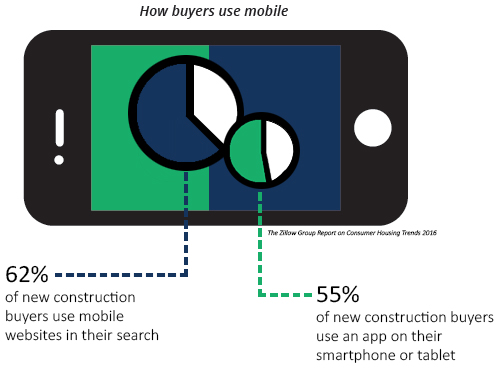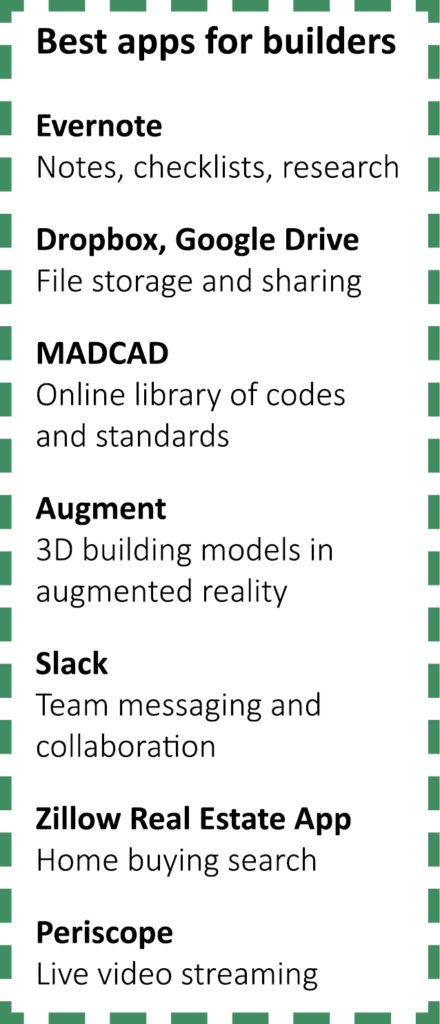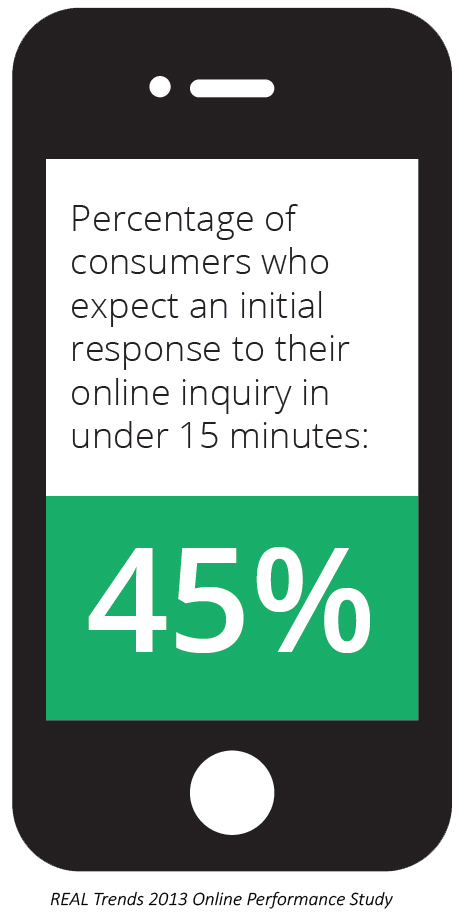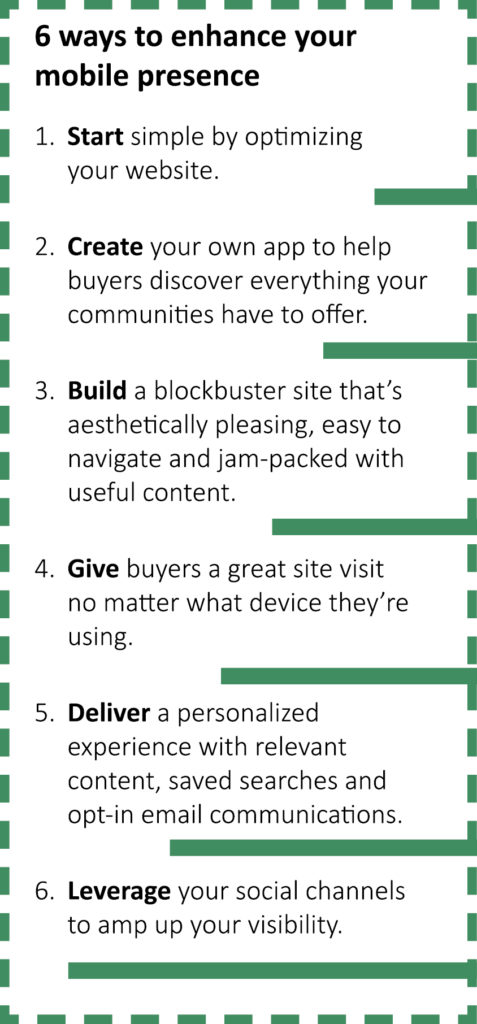Mobile First: A Win-Win Approach to New Construction Marketing

June 2, 2017
6 min read
Mobile is everywhere, and most consumers own at least one mobile device. But despite the prevalence of apps for meeting nearly every need — from calling up local building codes to mapping virtual floor plans — most new construction builders don’t know how to fully leverage the power of mobile technology and apps to educate and engage buyers, let alone have a plan for incorporating mobile into their marketing efforts.
Mobile — as a technology and a strategy — has the versatility and reach to help new construction marketers rise above their competitors.
Key takeaways
- Mobile isn’t the future; it’s today.
- Buyers want information right here, right now.
- The best mobile tools allow builders to reach buyers when and where they’re searching.
- Savvy builders use mobile apps as part of a successful marketing strategy.
The state of mobile
No matter where you are these days — walking down the street, riding the train, shopping in a store — the familiar sight of heads bent over smartphones reminds us how thoroughly technology saturates the fabric of daily life. More than 90 percent of American adults own a cell phone and 64 percent of them own a smartphone.1
'Mobile' — the hardware, software, marketing channel, state of being and mindset — is about immediate accessibility to products, services and information.

We want to be where people are looking. We know that when buyers are looking for homes, oftentimes they’re driving around — and if they’re in an area or neighborhood where they want to live, they have their phone and they’re looking for listings.
Time spent using mobile devices has increased 132 percent since 2011, and consumers spend 89 percent of their media time using mobile apps.2,3
Adopting a mobile-first approach to new construction marketing makes it easier for home buyers to find and connect with you. Savvy builders use mobile apps to respond to leads, disseminate information, coordinate their team and otherwise run their business. Readily available — often free — mobile apps automate tasks while still providing you an opportunity to add the human touch that’s vital in building relationships.

Mobile technology has provided lots of new ways to reach consumers, and we’re constantly investigating the right use of that technology for our company.
Note: Mobile apps are not synonymous with mobile web. A mobile app is a native program that was specifically designed for use on devices like smartphones and tablets. Users can download an app and often access its content offline. A mobile website has been optimized for viewing and navigation on mobile devices and requires internet access.
Mobile is strategic
Mobile is important to buyers looking for homes: 56 percent of total buyers use mobile web during their home search and 48 percent use apps; those numbers are even higher — 62 percent and 55 percent, respectively — for new construction home shoppers.4 How can you leverage this knowledge to your maximum benefit?
A mobile-savvy builder makes a point of having:
- A mobile device and the right apps to market their communities and coordinate their teams anytime and from anywhere.
- A mobile platform to ensure buyers can easily navigate their content.
- A mobile strategy that ties everything together.
Your strategy could include tactics such as optimizing your website for mobile devices and enabling automated text responses to quickly reply to leads. Your goal? Make it easy for buyers to find you and do business with you.
Back in 2013, LGI Homes looked at the trends and analytics that showed us mobile users were on the rise, and decided to put a strategy in place before the majority of consumers were on mobile. We started by using responsive design for mobile web to make sure our content was optimized for all experiences.
Mobile is fast

Adults in the U.S. check their phones an average of 46 times a day, which means that most people are 'always on.'5 Today’s buyer gets an instant response with a tap or a swipe on their phone; they expect the same speedy action from you.
A groundbreaking study about online lead response times found that a business is 100 times less likely to make contact with a lead if they wait more than 30 minutes before calling back.6 Conversely, a business is 100 times more likely to make contact if they call the lead back within 5 minutes.
A mobile customer relationship management (CRM) system that notifies you as soon as a contact comes in enables you to respond immediately via phone, text message or a quick email — or even forward the contact to another team member if you can’t reply yourself.
After your initial response, follow up as soon as possible. Mobile apps can be part of workflows that help you manage and personalize several tasks, including:
- Handling incoming leads.
- Directing buyers to nearby communities, sharing model home hours, and delivering promotions and special offers.
- Touching base with past clients.
Be responsive. You expect the phone to solve your problem immediately. Same goes for buyers. If they see a house they like, they will pull up the app and contact you. They want an answer now and they want help.
Mobile is smart
Can mobile really help you attract more buyers, convert leads and track your marketing ROI? Yes, it can.
Eighty-nine percent of new construction buyers use online resources during their search7, so your mobile marketing efforts are more likely than ever to reach target buyers—and can be more effective when they do. For example, you can send geotargeting ads to buyers who happen to be near your model homes and invite them to stop by and check them out.
As a home builder, we know that if buyers are out driving around, they might launch the Zillow app, and if we’re on there, they are going to find our information. It’s going to be relevant, close to where they are and optimized for mobile.
If you provide a superior mobile experience, buyers are more likely to opt in to receive additional information from you. According to a recent study on mobile search habits, '70 percent of consumers are willing to share their location information if they believe they are getting something of value in return, such as coupons and loyalty points.'8
Making sure that LGI is accessible on all platforms is in the forefront of our minds. Being aware of every aspect of the consumer experience has made all the difference.
Mobile marketers can calculate their ROI based on a variety of metrics, including web traffic, content downloads, click-through rate, leads generated, engagement rate, conversion rate and cost per conversion.

Mobile is agile
Being able to market your communities anytime, anywhere, is what will keep you steps ahead of the competition. That means having the right tools at the right time to handle issues quickly and efficiently.
A mobile real estate app can facilitate several marketing tasks, such as managing model homes, updating prices, coordinating your team, managing marketing campaigns and following up with leads. With a mobile app, you can do all that in the field — without having to return to the office to use your laptop.
Mobile technology is there when you can’t be. It replies to inquiries that come in when you’re with a buyer or after-hours, communicates with leads so that you can stay top of mind with them, and automates tasks so you can focus on other lead generation and conversion activities.
Mobile technology is designed to be everywhere and always on, offering buyers and builders instant communication, information and resources with just a tap or a swipe. New construction builders who embrace a mobile mindset are positioning themselves to stay current with the industry and competitive in their market.
Want more buyers to find you? For more information, contact us at buildersales@zillow.com.
1. Pew Research Center, Mobile Technology Fact Sheet, December 2014
2. Google/Millward Brown Digital Real Estate Study, December 2014
3. The Cross-Platform Report, The Nielson Company, Q4 2013
4. The Zillow Group Report on Consumer Housing Trends 2016
5. Deloitte 2015 Global Mobile Consumer Survey
6. How Much Time Do You Have Before Web-Generated Leads Go Cold, InsideSales.com, James B. Oldroyd, Trust Media, 2007
7. The Zillow Group Report on Consumer Housing Trends 2016
8. Local Search Association, Local Mobile Search Study
Builders, meet buyers.
82 percent of prospective buyers consider new construction.* Make it easy for them to find you – list where they’re looking.
*Zillow New Construction Consumer Housing Trends Report 2025
Learn More